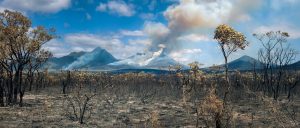Earlier this year, in a WA first, a regional clinical group appointed an environmental health and climate change expert to add an environmental lens to health planning, acknowledging the important link between health and climate change.
WA Primary Health Alliance is benefiting from the expertise of CEO of Gondwana Link, Keith Bradby OAM, now a member of its Great Southern Regional Clinical Committee.
He also provides important connections to research undertaken by the University of Western Australia and Doctors for the Environment.
The organisation has made this move, acknowledging the impacts on regional and remote populations from climate change with increasing temperatures, rainfall changes, fire risk, extended fire seasons and rising sea levels.

The results of storm, drought, flood, heatwave and bushfire have an overwhelming impact on water and air quality, agricultural production, the cost of food and water, population distribution (especially in regional areas), and health and wellbeing.
The social impacts of mental ill health of loss of habitation, poverty, displacement, conflict, and heat stress-related mortality and morbidity, particularly among older adults, can be devastating.
For people in regional and remote areas of Australia who have been part of the climate change discourse, and who have waited patiently for action against ‘the biggest global health threat of the twenty first century’, the good news is things are starting to happen.
Globally the United Nations – Sustainable Development Goals recognise the importance of the broader relationship between the environment, health and wellbeing, and Australia signed the Paris Agreement committing to reducing greenhouse gas emissions to 26 to 28 per cent below 2005 levels by 2030. The Australian Government has committed resources by supporting an emissions reduction fund, a renewable energy target, a national energy productivity plan, fuel efficiency in Australian fleet vehicles and reducing ozone depleting substances under the Montreal Protocol.
In Western Australia, the Premier’s Priorities include development of a Climate Change Policy to be completed in 2020, with a Climate Change Issues Paper highlighting priority action areas and seeking community input.
Additionally, the Western Australian Sustainable Health Review recommended an inquiry into the health impacts of climate change and requested recommendations to improve climate change mitigation and public health adaptation strategies, including smart city principles.
WA Primary Health Alliance’s role is to plan, guide and direct investment towards community-based treatment services and support general practice to ensure equitable access to primary health care for those most at risk of poor health outcomes.
This gives us a good understanding of vulnerable groups impacted by climate change, particularly women and children, older adults, those with pre-existing medical conditions, lower socio-economic communities, and people living in rural and remote areas.
We look forward to seeing the Great Southern’s progress and how this new direction can help us to achieve better health, together with clinicians, service providers, state health agencies and the wider community.
